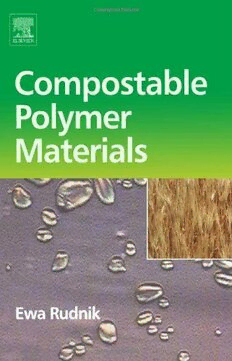
Compostable Polymer Materials PDF
224 Pages·2008·0.866 MB·English
Most books are stored in the elastic cloud where traffic is expensive. For this reason, we have a limit on daily download.
Preview Compostable Polymer Materials
Description:
Compostable plastics undergo degradation by biological process during composting to yield CO2, water, inorganic compounds, and biomass at a rate consistent with other known compostable materials and leave no visible, distinguishable or toxic residue. Compostable packaging materials made from biopolymers are being introduced into the market to reduce the amounts of conventional packaging materials and at the same time allow recovery by municipal organic waste collection systems. Current legislation encourages polymer processors to seek more environmentally friendly materials with sustainable life cycles. Composting at the end of life will become an increasingly attractive route for the disposal of redundant polymers.This book provides up-to-date results and information about compostable polymer materials in a coherent and comprehensive manner. It covers the entire spectrum of preparation, properties, degradation, and environmental issues. The emphasis is on recent studies concerning compostability and ecotoxicological assessment of polymer materials - important issues from the ecological point of view. Moreover, the thermal behaviour of compostable polymers is described. Their price evolution over the last decade, an estimation of the market and future perspectives are presented. - Focus on the composting process, compostability standards, compost quality and composting studies- Coherent and uniformly presented information about methods of preparation; properties, processing and applications- Up-to-date information on ecotoxicity testing and studies of polymers- Overview of thermal stability and thermal degradation process of compostable polymer materials- Presents future perspectives of compostable polymers, including evolution of price during last decade- Information about waste management evolution in Europe, USA and Asia (China) with emphasis on composting during the last decade
See more
The list of books you might like
Most books are stored in the elastic cloud where traffic is expensive. For this reason, we have a limit on daily download.
